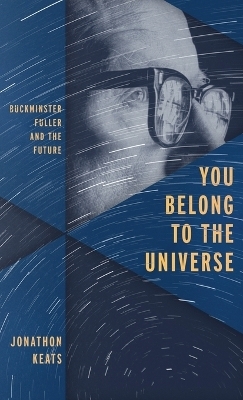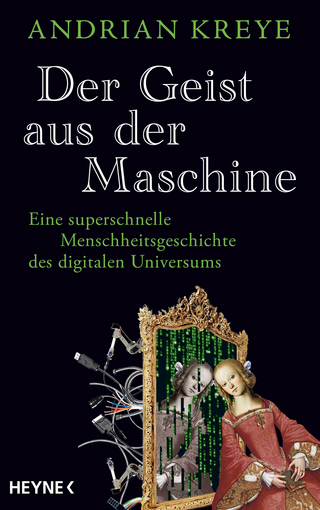
You Belong to the Universe
Buckminster Fuller and the Future
Seiten
2016
Oxford University Press Inc (Verlag)
978-0-19-933823-8 (ISBN)
Oxford University Press Inc (Verlag)
978-0-19-933823-8 (ISBN)
You Belong to the Universe documents Buckminster Fuller's six-decade quest to "make the world work for one hundred percent of humanity." Jonathan Keats sets out to restore Fuller's good name, placing Fuller's philosophy in a modern context.
A compelling call to apply Buckminster Fuller's creative problem-solving to present-day problems.
A self-professed "comprehensive anticipatory design scientist," the inventor Buckminster Fuller (1895-1983) was undoubtedly a visionary. Fuller's creations often bordered on the realm of science fiction, ranging from the freestanding geodesic dome to the three-wheel Dymaxion car to a bathroom requiring neither plumbing nor sewage. Yet in spite of his brilliant mind and life-long devotion to serving mankind, Fuller's expansive ideas were often dismissed, and have faded from public memory since his death.
You Belong to the Universe documents Fuller's six-decade quest to "make the world work for one hundred percent of humanity." Critic and experimental philosopher Jonathon Keats sets out to revive Fuller's unconventional practice of comprehensive anticipatory design, placing Fuller's philosophy in a modern context and dispelling much of the mythology surrounding Fuller's life. Keats argues that Fuller's life and ideas, namely doing "the most with the least," are now more relevant than ever as humanity struggles to meet the demands of an exploding world population with finite resources. Delving deeply into Buckminster Fuller's colorful world, Keats applies Fuller's most important concepts to present-day issues, arguing that his ideas are now not only feasible, but necessary.
From transportation to climate change, urban design to education, You Belong to the Universe demonstrates that Fuller's holistic problem-solving techniques may be the only means of addressing some of the world's most pressing issues. Keats's timely book challenges each of us to become comprehensive anticipatory design scientists, providing the necessary tools for continuing Fuller's legacy of improving the world.
A compelling call to apply Buckminster Fuller's creative problem-solving to present-day problems.
A self-professed "comprehensive anticipatory design scientist," the inventor Buckminster Fuller (1895-1983) was undoubtedly a visionary. Fuller's creations often bordered on the realm of science fiction, ranging from the freestanding geodesic dome to the three-wheel Dymaxion car to a bathroom requiring neither plumbing nor sewage. Yet in spite of his brilliant mind and life-long devotion to serving mankind, Fuller's expansive ideas were often dismissed, and have faded from public memory since his death.
You Belong to the Universe documents Fuller's six-decade quest to "make the world work for one hundred percent of humanity." Critic and experimental philosopher Jonathon Keats sets out to revive Fuller's unconventional practice of comprehensive anticipatory design, placing Fuller's philosophy in a modern context and dispelling much of the mythology surrounding Fuller's life. Keats argues that Fuller's life and ideas, namely doing "the most with the least," are now more relevant than ever as humanity struggles to meet the demands of an exploding world population with finite resources. Delving deeply into Buckminster Fuller's colorful world, Keats applies Fuller's most important concepts to present-day issues, arguing that his ideas are now not only feasible, but necessary.
From transportation to climate change, urban design to education, You Belong to the Universe demonstrates that Fuller's holistic problem-solving techniques may be the only means of addressing some of the world's most pressing issues. Keats's timely book challenges each of us to become comprehensive anticipatory design scientists, providing the necessary tools for continuing Fuller's legacy of improving the world.
Jonathon Keats is a writer, artist and experimental philosopher. He is recently the author of the story collection The Book of the Unknown (Random House), winner of the American Library Association's 2010 Sophie Brody Medal, as well as Virtual Words: Language on the Edge of Science and Technology (2010) and Forged: Why Fakes are the Great Art of Our Age (2013), both published by OUP.
GUINEA PIG B ; The Buckminster Fuller Myth ; HOW TO MAKE THE WORLD WORK ; Six Visions ; I. Mobility: The Dymaxion Car ; II. Shelter: The Dymaxion House ; III. Education: Two-Way TV ; IV. Planning: The Geoscope ; V. Environment: The Dome Over Manhattan ; VI. Peace: The World Game ; THE RANDOM ELEMENT ; The Buckminster Fuller Legacy
| Erscheinungsdatum | 12.03.2016 |
|---|---|
| Verlagsort | New York |
| Sprache | englisch |
| Maße | 145 x 211 mm |
| Gewicht | 318 g |
| Themenwelt | Literatur ► Biografien / Erfahrungsberichte |
| Sachbuch/Ratgeber ► Natur / Technik | |
| Geschichte ► Teilgebiete der Geschichte ► Technikgeschichte | |
| ISBN-10 | 0-19-933823-X / 019933823X |
| ISBN-13 | 978-0-19-933823-8 / 9780199338238 |
| Zustand | Neuware |
| Informationen gemäß Produktsicherheitsverordnung (GPSR) | |
| Haben Sie eine Frage zum Produkt? |
Mehr entdecken
aus dem Bereich
aus dem Bereich
Buch | Softcover (2024)
Lehmanns Media (Verlag)
19,95 €
Eine superschnelle Menschheitsgeschichte des digitalen Universums
Buch | Hardcover (2024)
Heyne (Verlag)
24,00 €


